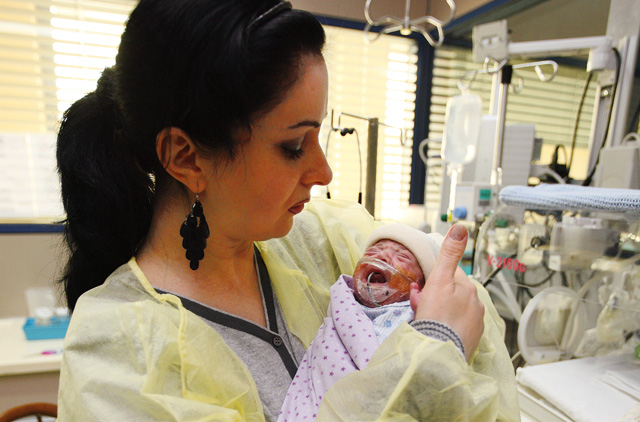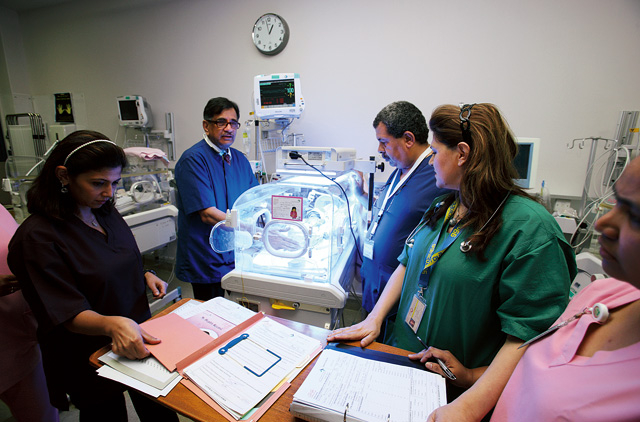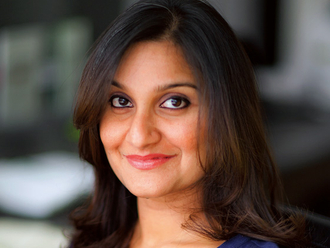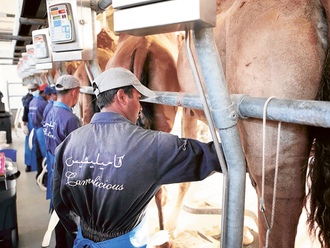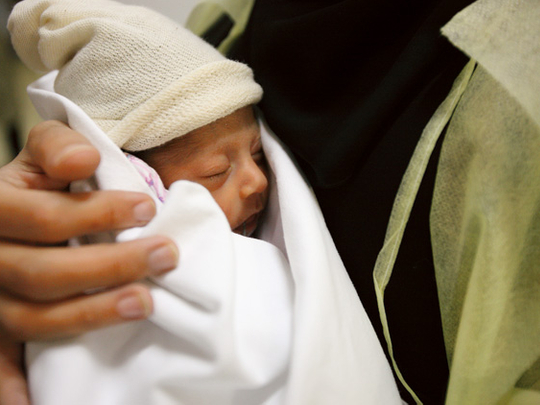
Opening the door to the unit, new mum Luminita Qambar tiptoes down the corridor. With 44 babies on the ward, she expects to be met by a cacophony of shrieks and cries. But the Neonatal Intensive Care Unit (NICU) at Al Wasl Hospital, Dubai, is eerily silent. Even the hum from the bank of state-of-the-art infant care machines is barely audible.
A nurse leads Luminita, 36, to her eight-week-old son Mohammad, lying in the glass incubator that, with its temperature-controlled environment, mimics a mother's womb. Careful not to disturb two tubes monitoring his vital signs, the nurse scoops up the baby and lays him in Luminata's arms. She smiles as she cuddles her baby, placing him against her warm skin just the way she has been taught by the nurses.
The hug isn't just a special moment of bonding with her baby, who was born nine weeks early, weighing just 1kg. Research has shown that ‘Kangaroo Mother Care', where mothers cradle their babies, with skin-to-skin contact, can save lives.
"I come here every morning and spend the whole day with my baby boy," says Dubai-based Luminita. "Nothing gives me greater pleasure than holding him, talking and singing to him, allowing him to touch and feel my skin, as well as breast-feeding him as often as is necessary."
Born at 26 weeks by Casarean section because her waters had broken and the baby was in distress, a team of dedicated neonatalogists and nurses at the hospital worked tirelessly to help Mohammad survive. Luminita has spent every moment since he was born doing everything she can to help him. When she comes in to meet Mohammad, she makes sure she has showered and is wearing a fresh cotton dress because babies who have been on ventilators have weak lungs and are hyper-reactive to strong smells that can induce wheezing. She refrains from wearing perfume so her baby can also smell her real scent. She feeds him on demand and cuddles him against her skin while talking and singing to him - and it's obviously working.
Mohammad is now now 1.8kg and ready to go home in a couple of days. "There is no better feeling in the world than holding my baby close to me and hearing the rhythmmic rise and fall of his soft body and feel his warmth," Luminita smiles. "When Mohammad was born premature, looking at his tiny frame, I was really scared that I would never be able to hold him, but I never allowed myself to think about losing him. We are so happy with the team at NICU for looking after our son with so much care.''
Helping about 500 babies every year
Luminita and her husband Adel are not the only grateful parents; the walls of the unit are decorated with scores of thank-you cards from parents whose babies were treated and saved here. Some even have photographs of the babies who have now grown up and in school.
"On an average, around 500 premature babies graduate to regular life at NICU each year,'' says Dr Arif Faquih, consultant neonatologist. Set up in 1987, the NICU is the top speciality healthcare department in Dubai equipped to handle all kinds of pre-term delivery complications. It is also able to carry out correctional surgeries on newborns.
Equipped to look after 34 sick babies at a time, it can stretch to accommodate up to 50 in highly specialised womb-simulating incubators connected to half a dozen monitors and life-saving devices.
A specialist team of 19 neonatology doctors and 120 nurses, along with secondary staff, work round the clock to give the babies a fighting chance. "The five years I have worked in this ward have been very hectic, but I wouldn't think of trading places because it has also been one of the most fulfilling periods of my life,'' says nurse Fritzy Devon, 35, who came from the Philippines.
"Our main concern is to save a life. The strength of our NICU comes from being a part of Al Wasl Hospital, which is the largest maternity-children's hospital. Our CEO Dr Abdulla Al Khayyat focuses on providing excellent care for children and their families," says Dr Alaa Eldermerdash who is in charge of the unit.
The unit operates an open door policy. "We would never refuse admission to anyone. In case of emergencies, even mothers who are not booked at AWH are accommodated," explains Dr Arif. "If we are full, we first direct them to our sister organisation, the Dubai Hospital, and if the beds are full there, we make arrangements on behalf of the mother at a private hospital."
Going by the Kangaroo Mother Care theory, it is never too early to hold the baby. "If babies are stable, even if they weigh 500g, we want the mothers to come in from day one and begin holding their babies," says Dr Arif. "It has a tremendous psychological impact on the baby and it shows in the improved vital signs immediately. We never tire of telling mothers how important it is and are very insistent that they do whatever they can to be with the baby at NICU for as long as they can."
Rising global trend
There has been an increase in the number of pre-term babies being born around the world. In the United States, about 12 per cent of all babies are born before 37 weeks - after this a baby is considered full term - and the percentage is rising. The global trend is also reflected at Al Wasl Hospital where around 14 per cent of all babies are preterm.
Preterm birth is the leading cause of newborn deaths. Most premature births are caused by spontaneous pre-term labour, and latest research suggests many cases are triggered by the body's natural response to certain infections. But in about half of all cases, healthcare providers cannot determine why a woman delivered prematurely. In vitro fertilisation techniques also carry a risk of premature delivery of twins, triplets and quadruplets.
At the unit here, the neonates are categorised according to international norms into Level I (basic care), II (moderately sick) and III (extrememly ill). "The severity depends not so much on birth weight but on the stage of gestation when the baby is delivered," Dr Arif says. "A baby born at 28 weeks gestation with a birth weight of 1kg has a better chance of pulling through rather than a baby born at 25 weeks with the same birth weight."
The NICU nurses providing care to the babies are given specialist training that includes neonatal resuscitation, basic life support, infection control, medication management and are taught how to provide S.T.A.B.L.E. CARE - this is an acronym that stands for the six assessment and care modules; monitoring vital Signs, Temperature, Airways, Blood pressure, Laboratory work and Emotional support.
The specialist mini-laboratory in the NICU has sophisticated instruments designed to give extensive and comprehensive medical reports after analysing just a drop of blood collected using a thin capillary tube from the baby's foot. "We try and ensure that different investigations are pooled in so that we do not prick the baby too often. Only in cases where the test is absolutely mandatory we do it," says Dr Arif.
The incubators simulate an environment that is as close to the womb to the best possible extent. This means maintaining a thermo-neutral temperature (an environment that enables a newborn to maintain a body temperature of 36.4°C with a minimal requirement of energy and oxygen) and a humidity range of between 40-90 per cent.
Machines monitor and control the vital signs of the baby such as the temperature, heart rate, blood pressure, oxygen saturation, and carbon dioxide levels. Even the slightest change in any of the vitals alerts an alarm system and the nurses on duty, who move from baby to baby, adjusting the monitors, switching on or off the light for jaundice therapy, administering expressed breast milk through tubes and syringes, changing or cleaning clothes.
A team effort to give best possible care
The longest shift for a physician in the unit lasts for 18 hours. Every morning the previous night's staff gives a report on each infant, explaining in detail any major change that might have occurred while also updating all records before the handover to the morning shift.
Critical care is discussed and specialists confer on the line of treatment. Says Dr Alaa: "We are fortunate to have a full team of paediatric surgeons and neurologists. We also have the only geneticist in town, Dr. Fatma Bastaki. I cannot stress enough how important good antenatal care is to the health of the baby and mother."
One of the things the NICU doctors insist on is that infants be fed only breast milk. Mothers are encouraged to spend as much time as they can with their baby and breast-feed them on demand. If, for any reason, the mother is unable to feed the baby she is asked to express the milk, which is then stored in a special refrigerator, and later thawed in bottle warmers.
The doctors encourage both parents to spend a lot of time with their baby. "We encourage skin-to-skin contact of parents with the baby. As soon as a baby is held close to its parents, all the vital signs stabilise and recovery is accelerated," says Dr Arif. Depending on availability, those living far from the hospital are given accommodation in the hospital. "If possible I try to arrange for the mother to board with us," he says.
Care and counselling offered
Not all infants are fortunate to make it out of the NICU. "We try very hard but sometimes children as fragile as these catch infections," says Dr Javed Habibullah, consultant neonatologist in charge of infection control. These often prove fatal. In cases of infection Dr Mahmoud El Halik and members of the NICU Infection Control Task Force ensure all steps are taken to prevent it from spreading.
When babies are born too premature, before 23 weeks, the doctors prefer to tell the truth about their chances of survival to parents. Dr Arif explains: "We counsel the parents before the delivery if time permits; a clear picture is given to them of how slim the chances of survival are. However the decision to provide care is discussed in detail with the parents in the presence of the obstetrician and then the management is planned. When parents lose a child despite the best efforts, the parents are offered bereavement counselling."
Like Luminita, Aliya Jamal travels from Mizhar to be with and nurse her twin daughters Mahid and Manaa who were born at 26 weeks, each weighing 1.3 kgs. After feeding, she cradles one in each arm and talks to them. The babies have been at the NICU for a little over three weeks and will spend at least seven more weeks here. "I am trying to get the escort facility at the hospital - where parents of the little ones who are living far from the hospital can stay over - so I can be close to my babies, as I can see my touch and breast feeding have worked wonders," she says.
Mariam Moosa, too, wants to give her daughters all the love she can. Her twins Maria and Hajer were born at 30 weeks, two weeks ago. Now weighing 1.3kg they'll be ready to go home in a few weeks. "I am so proud of my girls, they are tough surviors," Mariam says.
Dolly and Ambarish Solanki are proof that patience pays off. They spent four and half months at the NICU looking after their baby, Freya, who was born at 27 weeks. "She weighed 910g with several complications, including bleeding in the brain, a distended intestine, an enlarged duct in her heart and fluid in her brain," recalls Dolly. "The doctors didn't give up. They worked a miracle on my baby. They taught us to hold her, touch her and talk to her. Freya came out of all the surgeries and it has been such a learning experience for us."
The baby, who is asleep, is fragile but looks the picture of health. "I cannot explain how important it was for me to hold Freya and give her the warmth of my body. In the beginning, we were afraid, but we realised our touch was like life-breath for her. The doctors at NICU made us realise the importance of being physically close to our baby. We don't know how to thank them for their hard work," she says.
Luminita agrees. "It has taken me so long to be a proud mum. I cannot express my happiness in words." Thanks to them, soon Mohammad will be sleeping in his own cot at home.
Calculating the age
Freya Solanki was born five months premature, but her corrected age is three months. Dr Arif explains how the real age of pre term babies is calculated. "Babies who are born prematurely often have two ages. Chronological age is the age of the baby from the day of its birth - the number of days, weeks or years old the baby is. Corrected age is the age of the baby based on its due date. We care providers may use this age when we evaluate the baby's growth and development. So if a baby is six months old, but was born two months early, its corrected age is four months."
"Our main concern is to save a life. The strength of our NICU comes from being a part of Al Wasl Hospital, which is the largest maternity-children's hospital. Our CEO Dr Abdulla Al Khayyat focuses on providing excellent care for children and their families," says Dr Alaa Eldermerdash who is in charge of the Unit. Freya's case is a good example of why Al Wasl NICU excels". he emphasises, "To provide care for complex cases, you need a team of dedicated nurses, and doctors in many different specialties. We are fortunate to have a full team of paediatric surgeons and pediatric neurologists. We also have the only geneticist in town, Dr. Fatma Bastaki. And it all starts with the proper management during the pregnancy from our obstetricians. I can not stress enough how important is good antenatal care to the health of the baby and mother."
Set up in 1987, the Al Wasl Hospital's NICU is one of the best super speciality departments in Dubai. Al Wasl hospital is a Joint Commission International (JCI-USA), Baby Friendly Hospital Initiative (UNICEF-WHO) accredited hospital which provides tertiary perinatal care to all pregnant women booked at the hospital. NICU, AWH is also the member of Vermont Oxford Network Database, USA. The Vermont Oxford Network is a non-profit voluntary collaboration of health care professionals dedicated to improving the quality and safety of medical care for newborn infants and their families. The Network comprises over 900 Neonatal Intensive Care Units around the world. There are only 9 NICUs in the Middle East. The database provides unique, reliable and confidential data to participating units for use in quality management, process improvement, internal audit and peer review.
The NICU is equipped and staffed to provide optimal and cost effective care to all neonates including those born pre-term or with serious medical or surgical conditions. NICU also assists a team of trained and dedicated paediatric surgeons to operate upon newly born with congenital defects needing emergency and planned surgeries.
What is Kangaroo Mother Care
Kangaroo Mother Care (KMC), a technique initially practised in 1983 in Bogota, Columbia as a means to combat the lack of resources in local hospitals, is a unique method of caring for low birth weight babies.
The diaper-clad baby is placed on to the bare chest of the mother to promote skin-to-skin contact. Usually doctors turn the head of the baby in such a way that the premmie's ears are just above the mother's heart. This is crucial to stabilise the vital signs of the baby.
Kangaroo Mother Care helped in lowering infant mortality rates from 70 per cent to an astounding 30 per cent. (info: http://themiracleofkangaroomothercare.com/kangaroo-mother-care-what-are-the-benefits/)
Its key features are:
- early, continuous and prolonged skin-to-skin contact between the mother and the baby;
- exclusive breastfeeding (ideally);
- it is initiated in hospital and can be continued at home;
- small babies can be discharged early;
- mothers at home require adequate support and follow-up;
- it is a gentle, effective method that avoids the agitation routinely experienced in a busy ward with preterm infants.
Almost two decades of implementation and research have made it clear that KMC is more than an alternative to incubator care. It has been shown to be effective for thermal control, breastfeeding and bonding in all newborn infants, irrespective of setting, weight, gestational age, and clinical conditions.
Infants provided with KMC could be discharged from the hospital earlier than the conventionally managed babies. It was also found that such babies gained more weight than those on conventional care.
Babies receiving KMC have more regular breathing and less predisposition to apnea and have reduced incidence of severe illness including pneumonia during infancy.
Interestingly, KMC helps parents as well. Mothers are less stressed during kangaroo care as compared with a baby kept in incubator. Mothers prefer skin-to-skin contact to conventional care.
They report a stronger bonding with the baby, increased confidence, and a deep satisfaction that they were able to do something special for their babies. Fathers felt more relaxed, comfortable and better bonded while providing kangaroo care.
(Info: www.newbornwhocc.org/pdf/KMC%20Network%20Booklet.pdf)
At 25 weeks, a preterm baby is about 35 cms long when measured from head to heel and weighs around 660 gms.
A full term (37 weeks gestational age) baby is around 48 cms and weighs 2.8 kg
Info: http://www.babycenter.com/average-fetal-length-weight-chart


